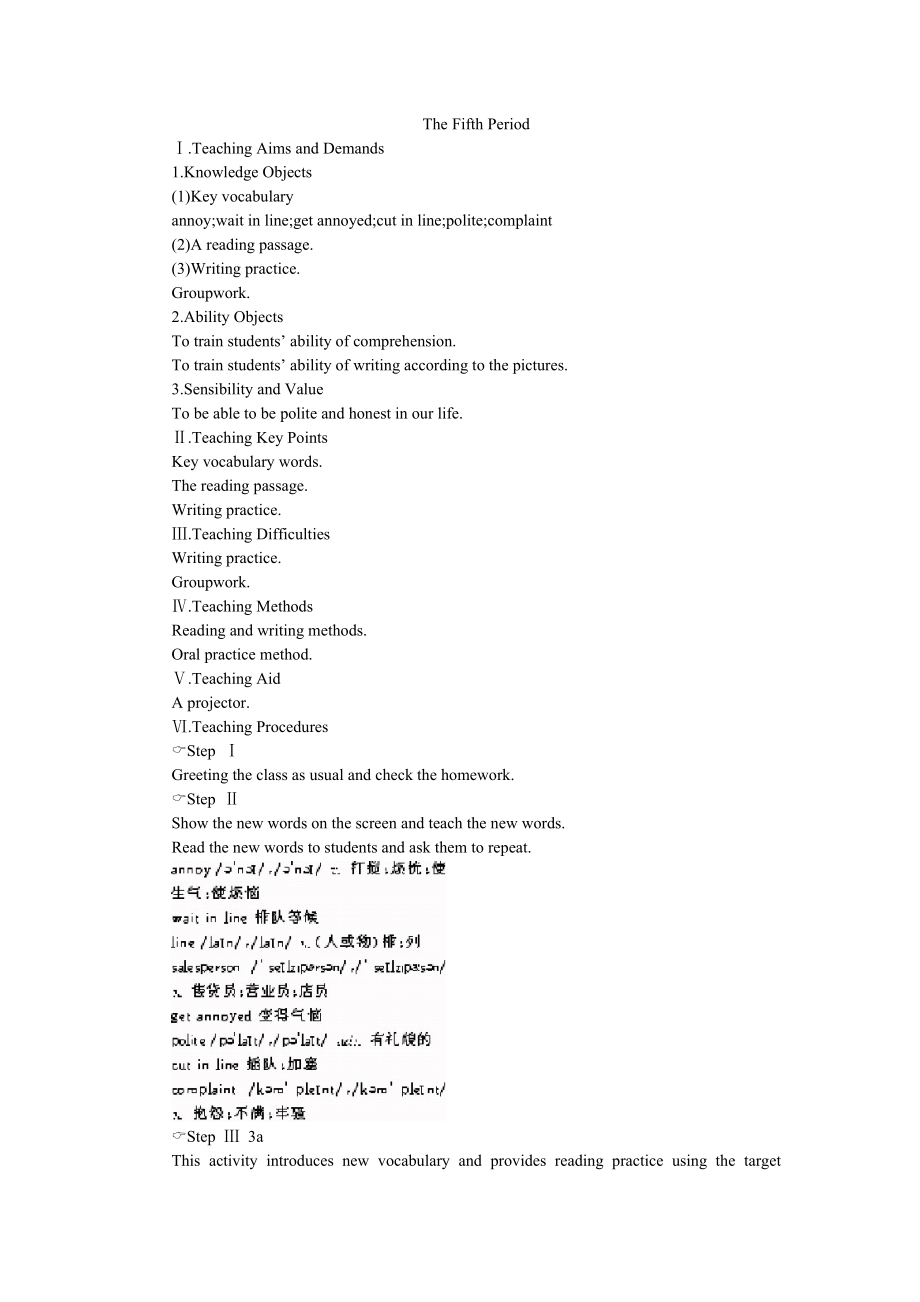《新目標(biāo)八年級(jí)下UNIT 7示范教案 THE 5TH PERIOD》由會(huì)員分享,可在線(xiàn)閱讀,更多相關(guān)《新目標(biāo)八年級(jí)下UNIT 7示范教案 THE 5TH PERIOD(3頁(yè)珍藏版)》請(qǐng)?jiān)谘b配圖網(wǎng)上搜索���。
1����、The Fifth Period
Ⅰ.Teaching Aims and Demands
1.Knowledge Objects
(1)Key vocabulary
annoy;wait in line;get annoyed;cut in line;polite;complaint
(2)A reading passage.
(3)Writing practice.
Groupwork.
2.Ability Objects
To train students’ ability of comprehension.
To train students’ ability of
2���、writing according to the pictures.
3.Sensibility and Value
To be able to be polite and honest in our life.
Ⅱ.Teaching Key Points
Key vocabulary words.
The reading passage.
Writing practice.
Ⅲ.Teaching Difficulties
Writing practice.
Groupwork.
Ⅳ.Teaching Methods
Reading and writing methods
3����、.
Oral practice method.
Ⅴ.Teaching Aid
A projector.
Ⅵ.Teaching Procedures
CStep Ⅰ
Greeting the class as usual and check the homework.
CStep Ⅱ
Show the new words on the screen and teach the new words.
Read the new words to students and ask them to repeat.
CStep Ⅲ 3a
This activity intr
4���、oduces new vocabulary and provides reading practice using the target language.
Look at the article and read it to the class.Ask students which words they don’t understand.Write these words on the board.
Look at the each word on the board and explain what it means.(Stand is another way to say bear.
5�、I couldn’t stand this life any more.He wasn’t able to stand the pain.Get mad is another way to say get angry.I get mad when the bus is late.I get mad when it rains and I don’t have my umbrella.Get annoyed is also another way to say get angry.He got annoyed to learn that he failed again in the exam.S
6���、he got annoyed when she heard about that.)Make sure students understand each word.
Let students read the article.When they understand all the sentences,ask them to underline the things that are annoying.Then have them circle what people do when something annoying happens.
Ask students to finish th
7��、e activity on their own.
Correct the answers with the class.
Answers
Underlined:waiting in line while a salesperson has a long telephone conversation;don’t like it when a salesperson follow me around;someone talks to me while I’m reading.
Circled:I usually say,Would you mind helping me?I usually
8�、 say,Could you please not follow me around?I’ll ask you if I need some help.I usually talk to the person.
CStep Ⅳ 3b
This activity reviews and introduces vocabulary and provides writing practice using the target language.
Look at the pictures with the class.Ask different students to tell what is
9���、happening in each picture.
Picture a
Some people are standing in the subway door.
A man wants to go through it.
Picture b
There are many people in the picture.
They are waiting in line.
But a boy wants to cut in line.
They are getting annoyed.
Provide key words as needed.Write these w
10��、ords on the blackboard.
Go through the instructions with the class.Point to the blank lines where students will fill in their answers.
Ask students to complete the activity on their own.
Correct the answers.
Answers
Answers will vary.
CStep Ⅴ 4 Groupwork
This activity provides speaking,listen
11�����、ing and writing practice using the target language.
Ask two students to read the dialogue.
A:What annoys you,Lin Zheng?
B:I get annoyed when classmates borrow my eraser and don’t return it.
A:What do you do?
B:...
Ask another pair of students to give another complaint and action.
Go through t
12���、he instructions with the class.Ask each other what sorts of things annoy them.
Ask students to complete the work in groups.When they work,walk around the room checking their progress and offering help if necessary.
Ask a few students to share the sample conversation.
List the most common complain
13����、ts and the best action advice.
CStep Ⅵ Culture note
People in some cultures feel it is impolite to complain openly about a problem.Instead,these people try to solve the problem quietly for themselves,or they speak softly and politely to the other person.People in some other cultures feel it is nor
14�、mal to complain when there is a problem and they try to solve it quickly and directly.Ask students which type of culture they think theirs is.If their culture uses the quieter approach,contrast this with the direct approach that is common in the United States.What are the advantages of each approach
15���、?
CStep Ⅶ Summary
This class we’ve had a lot of reading,writing and speaking practice using the target language.
In all the activities I hope you can learn to cooperate and make great progress together.
CStep Ⅷ Homework
Next class we’ll have our Self check paper.Please preview the exercises to see if you have any difficulty in understanding.
CStep Ⅸ Blackboard Design
Unit 7 Would you mind turning down the music?
stand—bear
get mad—get angry
get annoyed—get angry
wait in line
cut in line
 新目標(biāo)八年級(jí)下UNIT 7示范教案 THE 5TH PERIOD
新目標(biāo)八年級(jí)下UNIT 7示范教案 THE 5TH PERIOD

